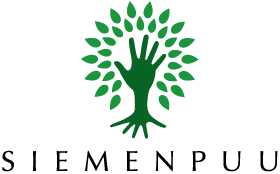Aikataulu:
Tapahtumapaikka: Zoom
The webinar focuses on the future of the Brazilian Amazon Region from the viewpoint of its traditional gatherer communities, the pedagogics developed by them, as well as the strategies employed by their youth.
The social movement of the gatherer communities in the Brazilian Amazon Region is represented by the gatherer people’s national council, CNS (Conselho nacional das populações extrativistas). Siemenpuu Foundation has supported CNS’ work for the Amazon forests and the people protecting them by living in them for over 15 years.
WEBINAR PROGRAMME:
– Kirsi Chavda’s introduction: Siemenpuu’s partnership with the CNS
– Noora Ojala’s audio-visual visit: Raimundão tells about sustainable production in the gatherer community (video)
– Cristina da Silva & Anselmo Gonçalves da Silva: History of the gatherer movement and its current challenges (pdf)
– Cristina da Silva: Pedagogy within the forest: encounter of the past with the potential protagonists of the Brazilian Amazon’s future (pdf)
– Anselmo Gonçalves da Silva: Decolonizing the Gatherer Reserves’ future with their youth (pdf)
– Discussion
– End note video: “Forest women decolonizing their paths”
The webinar language is English. Cristina da Silva’s and Anselmo Gonçalves da Silva’s presentations will be interpreted from Portuguese to English.
See also the Facebook event page.
***
SPEAKER INTRODUCTIONS:
Anselmo Gonçalves da Silva is a teacher at the Federal Institute of Acre (Brazil) and a PhD candidate of contemporary studies at the University of Coimbra, Portugal (currently an exchange student at the University of Helsinki). For three years, he functioned as a civil servant of the Acre state government, in the area of social assistance, health and social development. For nine years he served as an environmental analyst at the Chico Mendes Institute of Conservation of Biodiversity (ICMBio), working in the Chico Mendes Gatherer Reserve, Acre River Ecological Station and Descobrimento National Park. In addition, he has carried out projects in the indigenous territories of Cabeceiras do Rio Acre and Comexatiba.
Fátima Cristina da Silva is currently a doctoral student at the Faculty of Social Sciences at the University of Helsinki through the Erasmus+ programme. She is a PhD candidate at the Social Sciences Centre of the University of Coimbra, in the Risk Territory and Public Policies doctoral programme, and a junior researcher of the Risk Observatory OSIRIS-CES. She is a specialist in senior pedagogy (UFAC 1998, Brazil), as well a specialist in decentralised governance of health care and the environment (UFMA and MS 2004). She is also a pedagogy graduate from the Federal University of Acre (1994). For over two decades, she has been an activist supporting the forest peoples of the Brazilian Amazon. For five years, she managed projects of the Pro Indigenous Peoples Commission of Acre, and for 20 years, she coordinated the pedagogic projects of the gatherer people’s national council, CNS.
Noora Ojala is a board member of the Siemenpuu Foundation, as well as an audio-visual artist.
Kirsi Chavda is a Programme Coordinator at the Siemenpuu Foundation.
***
GATHERER PEOPLES’ NATIONAL COUNCIL, CNS (Conselho nacional das populações extrativistas)
CNS was founded in 1985, originally as a movement defending the rights of rubber tappers, the most discriminated agricultural workers of the Brazilian Amazon. Later on CNS moved on to defend the other Amazonian gatherer groups as well. It aims at an ecological agricultural reform: establishment of gatherer reserves, protection of forests and natural resources within the reserves, improvement of the quality of life of the people living within the reserves, their social organization and respect for their rights. CNS’ demands include: establishment of new gatherer reserves and expansion of some of the existing ones, resolving the status of third parties within the reserves, development of the technical assistance programme directed at the reserves, approval of forest management plans and granting of reserve user permits, setting of minimum prices for gatherer products, granting of credit for gatherers as well as development of health care, schooling, sanitation and housing within the reserves.
CNS represents approximately 1 000 grass-root gatherer organisations in different states of the Brazilian Amazon: trade unions, cooperatives and reserve dwellers’ associations. Reserve dwellers’ social organisation is the corner stone of its work. There are currently 635 gatherer reserves covering altogether over 66 million hectares and over 1 500 000 inhabitants. The products gathered from the forests inhabited by the traditional communities include for instance rubber, nuts, fruits and plant extracts, fibres, fish and seafood.
